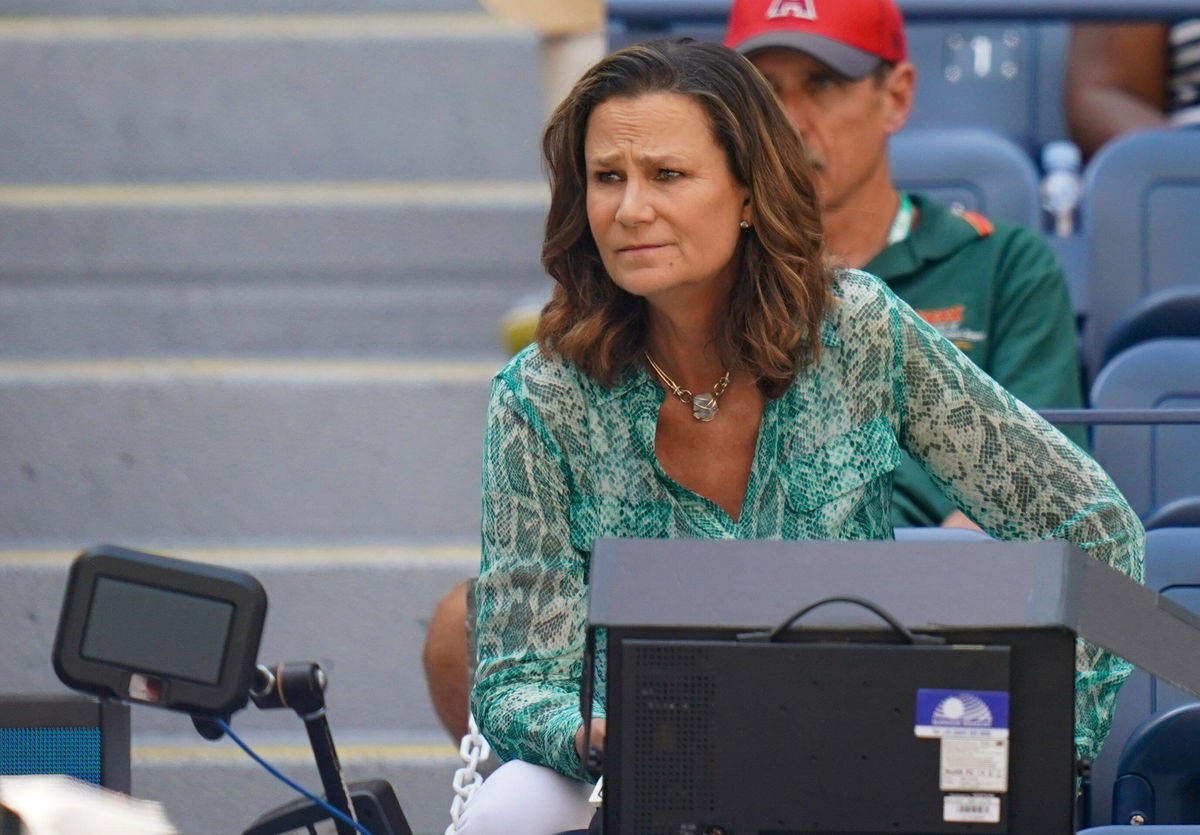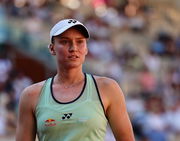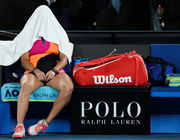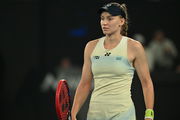
Imago
Mandatory Credit: Photo by Dave Shopland/BPI/Shutterstock 10377888ci Pam Shriver watches the quarterfinal between Elina Svitolina of Ukraine and Johanna Konta of Great Britain in the Arthur Ashe Stadium US Open Tennis Championships, Day 9, USTA National Tennis Center, Flushing Meadows, New York, USA – 03 Sep 2019 US Open Tennis Championships, Day 9, USTA National Tennis Center, Flushing Meadows, New York, USA – 03 Sep 2019 PUBLICATIONxINxGERxSUIxAUTXHUNxGRExMLTxCYPxROMxBULxUAExKSAxONLY Copyright: xDavexShopland/BPI/Shutterstockx 10377888ci

Imago
Mandatory Credit: Photo by Dave Shopland/BPI/Shutterstock 10377888ci Pam Shriver watches the quarterfinal between Elina Svitolina of Ukraine and Johanna Konta of Great Britain in the Arthur Ashe Stadium US Open Tennis Championships, Day 9, USTA National Tennis Center, Flushing Meadows, New York, USA – 03 Sep 2019 US Open Tennis Championships, Day 9, USTA National Tennis Center, Flushing Meadows, New York, USA – 03 Sep 2019 PUBLICATIONxINxGERxSUIxAUTXHUNxGRExMLTxCYPxROMxBULxUAExKSAxONLY Copyright: xDavexShopland/BPI/Shutterstockx 10377888ci
The French Open wrapped up nearly two weeks ago, but the chatter around it hasn’t settled. Sure, fans are still buzzing over Carlos Alcaraz’s gripping win against Jannik Sinner and Coco Gauff’s big moment. But there’s another storyline that refuses to die down — why weren’t any women’s singles matches played during the night sessions at Roland Garros? The issue has stirred up quite a debate. Several players, including Coco Gauff and Ons Jabeur, raised their voices during the tournament. Now, even after the clay has settled, an American WTA legend and doubles icon is calling out French Open tournament director Amelie Mauresmo for it.
Watch What’s Trending Now!
To understand the frustration, it’s worth taking a step back into history. The push for equal footing in tennis didn’t begin yesterday. It started all the way back in 1970, when Billie Jean King and eight other trailblazers signed symbolic one-dollar contracts with World Tennis publisher Gladys Heldman. These nine players broke away from the traditional tennis system to launch the Virginia Slims Series, taking a huge risk to show that women’s tennis deserved the spotlight too.
Three years later, that momentum led to the official birth of the Women’s Tennis Association. On June 21, 1973, more than 60 women players gathered at the Gloucester Hotel in London. From that meeting, the WTA was born. It’s a date the sport remembers and celebrates every year. Billie Jean King recently marked the anniversary on X with a celebratory post. But under that post, Pam Shriver dropped a pointed reply: “I wish the tournament director @rolandgarros had been in that room 52 years ago.”
ADVERTISEMENT
I wish the tournament director @rolandgarros had been in that room 52 years ago.
— Pam Shriver (@PHShriver) June 21, 2025
That strong reaction came after Mauresmo defended her controversial decision to leave women’s singles out of the French Open night sessions this year. For context, the night sessions were introduced in 2021 and feature only one singles match under the lights on Court Philippe Chatrier.
And here’s the pattern: since 2023, none of those primetime matches have been women’s singles. That’s 20 straight night sessions given to men. When asked why, Mauresmo said, “We have to take it into consideration as to the 15,000 spectators coming in for the night session. Since men’s tennis is played at the best-of-five sets, three sets will be played at a minimum. It’s complicated for us to do otherwise.”
ADVERTISEMENT
That explanation didn’t go down too well with fans or players. When asked whether she believed women’s matches were less worthy of that time slot, Mauresmo replied, “For me, the message is not changing, and it has never been that the girls are not worthy to play at night. It’s never been this. I will not accept that you carry this message. That’s really clear to me.”
Still, the absence of women in those sessions told its own story. Shriver had criticized her reasoning at that time, too.
ADVERTISEMENT
Pam Shriver calls out Amelie Mauresmo for “slapping” women’s tennis
Pam Shriver took her frustration to The Tennis Podcast as well, saying, “It’s extremely triggering, painful and disappointing to have a Tournament Director, former WTA player and No.1 in the world basically slapping women’s tennis in 2025. It’s horrendous to hear … she threw women’s tennis under the bus. It was horrible.”
Coco Gauff didn’t hold back either. She said the scheduling at the tournament needed to “improve” and stressed how important it was to showcase women’s tennis during primetime. Ons Jabeur also voiced her disappointment after an early exit from the tournament. “It’s still sad that we are still seeing this,” she said in her press conference. She added, “I hope whoever is making the decision, I don’t think they have daughters, because I don’t think they want to treat their daughters like this.” After that, Jabeur posted a heartfelt message on social media, standing up for women’s tennis and its value.
ADVERTISEMENT
Even WTA CEO Portia Archer joined the conversation. She didn’t throw blame on any one person but confirmed she would be meeting with Mauresmo soon to discuss how they could “effect change.” Archer made it clear that the issue needs fixing, regardless of who’s responsible.
Top Stories
How Much Did Aryna Sabalenka’s Australian Open Jewelry Cost? Designer and Materials Explained

Is Elena Rybakina Dating? All You Need To Know About WTA Star’s Boyfriend

Aryna Sabalenka to “Crying” and Tells Team to “F*** You” After Australian Open Loss

Breaking: Elena Rybakina Takes Down Aryna Sabalenka in Australian Open Final

Elena Rybakina’s Coach Slammed as Australian Open Final Tension Boils Over: “So Gross”

Wimbledon, the next Grand Slam, is unlikely to face a similar storm. The tournament doesn’t feature night sessions, sticking to a strict curfew system. This ensures high-profile matches, men’s or women’s, are spread throughout the day without bias.
For a sport that has prided itself on being at the forefront of gender equality, the French Open’s decision has clearly struck a nerve.
ADVERTISEMENT
ADVERTISEMENT
ADVERTISEMENT
ADVERTISEMENT
